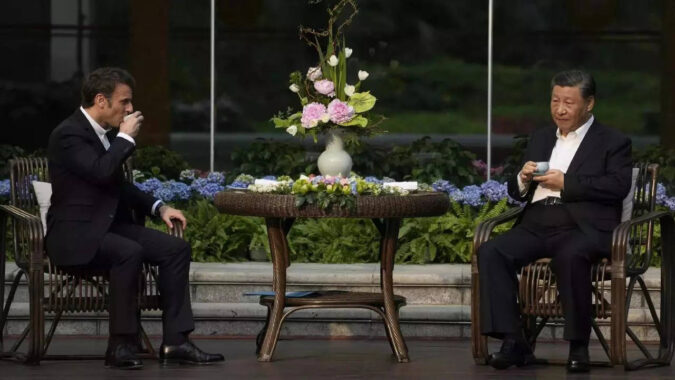PARIS: Comments by French President Emmanuel Macron over Europe’s priorities on Taiwan have raised questions over the EU’s relationship with both the US and China, on the eve of his planned speech on the bloc’s sovereignty in The Netherlands.
Macron’s remarks were published Sunday in an interview with the French newspaper Les Echos and Politico Europe.
“The question we need to answer, as Europeans, is the following: is it in our interest to accelerate (a crisis) in Taiwan? No,” Macron was quoted as saying in the interview. “The worst thing would be to think that we Europeans must become followers on this topic and take our cue from the US agenda and a Chinese overreaction.”
The comments were made Friday before China launched large-scale combat exercises around Taiwan that simulated sealing off the island in response to the Taiwanese president’s trip to the US last week.
Macron spoke to reporters on his way back from a three-day state visit to China, where he spoke at length with President Xi Jinping, including about Taiwan, according to Macron’s office.
The comments have drawn wide attention on social media, and experts raised questions about whether Macron’s views are in line with the European Union‘s position and whether the bloc of 27 is able to become the “third superpower” that Macron says he hopes to build within “a few years.”
Macron on Tuesday is to start a two-day state visit in The Netherlands, where he is scheduled to make a speech on Europe’s sovereignty, with a focus on the economy and industry, according to his office.
“We, Europeans, must wake up. Our priority is not others’ agendas in all regions of the world,” Macron said in the interview.
He emphasized the concept of “strategic autonomy” for Europe which he has promoted for years. He warned of what he called the “trap” that would lead to the bloc “getting caught up in crises that are not ours.”
“We don’t want to depend on others for critical topics,” he insisted.
Politico said Macron’s office asked to check the president’s quotes before they were published, a common practice in France, leading to some parts of the interview in which he “spoke even more frankly about Taiwan and Europe’s strategic autonomy” getting cut out.
Macron’s remarks were published Sunday in an interview with the French newspaper Les Echos and Politico Europe.
“The question we need to answer, as Europeans, is the following: is it in our interest to accelerate (a crisis) in Taiwan? No,” Macron was quoted as saying in the interview. “The worst thing would be to think that we Europeans must become followers on this topic and take our cue from the US agenda and a Chinese overreaction.”
The comments were made Friday before China launched large-scale combat exercises around Taiwan that simulated sealing off the island in response to the Taiwanese president’s trip to the US last week.
Macron spoke to reporters on his way back from a three-day state visit to China, where he spoke at length with President Xi Jinping, including about Taiwan, according to Macron’s office.
The comments have drawn wide attention on social media, and experts raised questions about whether Macron’s views are in line with the European Union‘s position and whether the bloc of 27 is able to become the “third superpower” that Macron says he hopes to build within “a few years.”
Macron on Tuesday is to start a two-day state visit in The Netherlands, where he is scheduled to make a speech on Europe’s sovereignty, with a focus on the economy and industry, according to his office.
“We, Europeans, must wake up. Our priority is not others’ agendas in all regions of the world,” Macron said in the interview.
He emphasized the concept of “strategic autonomy” for Europe which he has promoted for years. He warned of what he called the “trap” that would lead to the bloc “getting caught up in crises that are not ours.”
“We don’t want to depend on others for critical topics,” he insisted.
Politico said Macron’s office asked to check the president’s quotes before they were published, a common practice in France, leading to some parts of the interview in which he “spoke even more frankly about Taiwan and Europe’s strategic autonomy” getting cut out.
